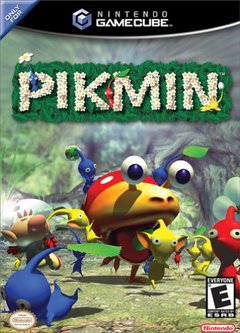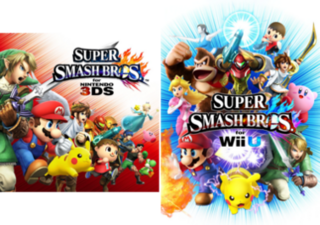Related Research Articles

Balloon Fight is an action video game developed by Nintendo and HAL Laboratory and published by Nintendo. The original arcade version was released for the Nintendo VS. System internationally as Vs. Balloon Fight, while its Nintendo Entertainment System counterpart was released in Japan in 1985 and internationally in 1986.

Pikmin is a 2001 real-time strategy puzzle video game developed and published by Nintendo for the GameCube. The game was created and produced by Shigeru Miyamoto, and is the first entry in the Pikmin series. The game's story focuses on an alien pilot, Captain Olimar, who crash lands on a mysterious planet and must make use of a native species called "Pikmin" to find his ship's missing parts in order to escape within 30 days. Players take control of Olimar and direct the different varieties of Pikmin to explore the game's various levels, overcoming obstacles and hostile creatures, in order to find and recover the missing ship parts.

Pikmin 2 is a 2004 real-time strategy puzzle video game developed and published by Nintendo for the GameCube. It is the direct sequel to the 2001 game Pikmin and the second game in the Pikmin series. In the game, Olimar returns to the Pikmin planet to collect valuable treasure after learning that the company he works for—Hocotate Freight—is on the verge of bankruptcy.
Pikmin is a real-time strategy and puzzle video game series created by Shigeru Miyamoto, and published by Nintendo. The games focus on directing a horde of plant-like creatures called Pikmin to collect items by destroying obstacles, avoiding hazards, and fighting fauna that are hazardous to both the player character and the Pikmin.

"Ai no Uta" is a song recorded by Strawberry Flower for Japanese TV commercials of the GameCube game Pikmin. It was written and produced by band member Takeshi Tomozuma. The song was later included in the "Pikmin World" soundtrack album, in three different versions. It is from the point-of-view of the Pikmin creatures.
Super Smash Bros. is a crossover platform fighting game series published by Nintendo. The series was created by Masahiro Sakurai, who has directed every game in the series. The series is known for its unique gameplay objective which differs from that of traditional fighters, in that the aim is to increase damage counters and knock opponents off the stage instead of depleting life bars.

In entertainment, a virtual band is a band or music group whose depicted members are not people, but animated characters or virtual avatars. The music is recorded by real musicians and producers, while any media related to the virtual band, including albums, video clips and the visual component of stage performances, feature the animated line-up; in many cases the virtual band members have been credited as the writers and performers of the songs. Live performances can become rather complex, requiring perfect synchronization between the visual and audio components of the show.
"Sing! Aiko" is a radio segment in Aiko's radio program Aiko's @llnightnippon.com, which aired from 1999 until 2003. When musical guests were invited to the program, Aiko would play the piano and cover the guests'—or others'—songs; sometimes, she sang her own songs with her guests. Rarely, Aiko would improvise a short song with a guest.

Animal Crossing is a social simulation video game series developed and published by Nintendo. The series was conceptualized and created by Katsuya Eguchi and Hisashi Nogami. In Animal Crossing, the player character is a human who lives in a village inhabited by various anthropomorphic animals and can do various activities like fishing, insect catching, and fossil hunting. The series is notable for its open-ended gameplay and use of the video game console's internal clock and calendar to simulate real passage of time.
The Mysterious Murasame Castle is an action-adventure video game developed by Nintendo and Human Entertainment and published by Nintendo for the Family Computer Disk System. It was released exclusively in Japan on April 14, 1986. The game was one of the early games released for the system, and the second original game after The Legend of Zelda. The game was released outside Japan for the first time on the Nintendo 3DS Virtual Console in Europe and Australia in May 2014 and in North America in August 2014. It was added to the Nintendo Switch Online service on October 31, 2023.
"Rock 'n' Roll Kenchōshozaichi" is a rockabilly song by Japanese singer/songwriter Chisato Moritaka, from her 1992 studio album Pepperland. Written by Moritaka, the song was released as the B-side of her 1993 single "Watashi no Natsu".

Ai no Uta(愛のうた / Song of Love) is the 37th single released by Japanese pop singer-songwriter Kumi Koda. The single was released in CD and CD+DVD, with limited editions carrying the "Urban Kiss Version" of Ai no Uta. The single was released on September 12, 2007, and followed the theme of Yume no Uta/Futari de... as an autumn/winter-time love ballad. It charted at No. 2 on Oricon and stayed on the charts for twenty-two weeks.

Super Smash Bros. Brawl is a 2008 crossover fighting game developed by Sora Ltd. and Game Arts and published by Nintendo for the Wii. The third installment in the Super Smash Bros. series, it was announced at a pre-E3 2005 press conference by Nintendo president Satoru Iwata. Masahiro Sakurai, director of the previous two games in the series, assumed the role of director at Iwata's request. Game development began in October 2005 with a creative team that included members from several Nintendo and third-party development teams. After delays due to development problems, the game was released worldwide in 2008.

Super Smash Bros. Melee is a 2001 crossover fighting video game developed by HAL Laboratory and published by Nintendo for the GameCube. It is the second installment in the Super Smash Bros. series. It features characters from Nintendo video game franchises such as Mario, The Legend of Zelda, Star Fox and Pokémon, and Donkey Kong among others. The stages and gameplay modes reference or take designs from these franchises as well.

"Rainbows" is the 13th maxi single by Alice Nine. It was released on August 6, 2008 in three different versions. Each version contains the title track and a B-side, which may include a booklet, a music video, or another bonus track, respectively within the three versions. The single marks a significant change in the band's overall dress style which no longer resembles their original Visual Kei look.

Super Smash Bros. for Nintendo 3DS and Super Smash Bros. for Wii U, both commonly referred together as Super Smash Bros. 4, are 2014 crossover platform fighter video games developed by Bandai Namco Studios and Sora Ltd. and published by Nintendo for the Nintendo 3DS and Wii U video game consoles. It is the fourth installment in the Super Smash Bros. series, succeeding Super Smash Bros. Brawl. The Nintendo 3DS version was released in Japan on September 13, 2014, and in North America, Europe, and Australia the following month. The Wii U version was released in North America, Europe, and Australia in November 2014 and in Japan the following month.

The Game & Watch brand is a series of handheld electronic games developed, manufactured, released, and marketed by Nintendo from 1980 to 1991. Created by game designer Gunpei Yokoi, the product derived its name from its featuring a single game as well as a clock on an LCD screen. The models from 1981 onwards featured an alarm in addition.

Mic-a-holic Ai is the fourth studio album by Japanese-American singer-songwriter Ai, released on July 7, 2005, by Island Records and Universal Sigma. It is the best selling album of Ai's career to date, being released just after Ai's single "Story" became a hit. The album was certified double platinum by the Recording Industry Association of Japan for 500,000 shipped copies.

Super Smash Bros. Ultimate is a 2018 crossover fighting game developed by Bandai Namco Studios and Sora Ltd. and published by Nintendo for the Nintendo Switch. It is the fifth installment in the Super Smash Bros. series, succeeding Super Smash Bros. for Nintendo 3DS and Wii U (2014). The game follows the series' traditional style of gameplay, in which players control one of the various characters and use attacks to weaken their opponents and knock them out of an arena. It features a wide variety of game modes, including a single-player campaign and multiplayer versus modes. Ultimate features 89 playable fighters, including all characters from previous Super Smash Bros. games as well as newcomers. The roster ranges from Nintendo characters to those from third-party franchises.
References
- ↑ "ABOUT | ganmatsumoto.com". www.ganmatsumoto.com. Retrieved 24 October 2022.
- ↑ "1-3 ストロベリーフラワーインタビュー". www.nintendo.co.jp.
- ↑ "愛のうた(曲) | 年代流行".
- ↑ "2000年代 邦楽ヒット曲 ランキング | 年代流行".
- ↑ "Sonia Lisboa, David Videria, Juliette Katz – Vos Meilleurs Amis - Song of Love (2002, CD)". Discogs .
- ↑ "1-3 ストロベリーフラワーインタビュー". www.nintendo.co.jp.
- ↑ "First Songs in My Music - Smash Bros. DOJO!!". Archived from the original on 16 March 2008.
- ↑ "- YouTube". YouTube .
- ↑ "歩くはやさで".
- ↑ "愛のうた". 12 September 2007.